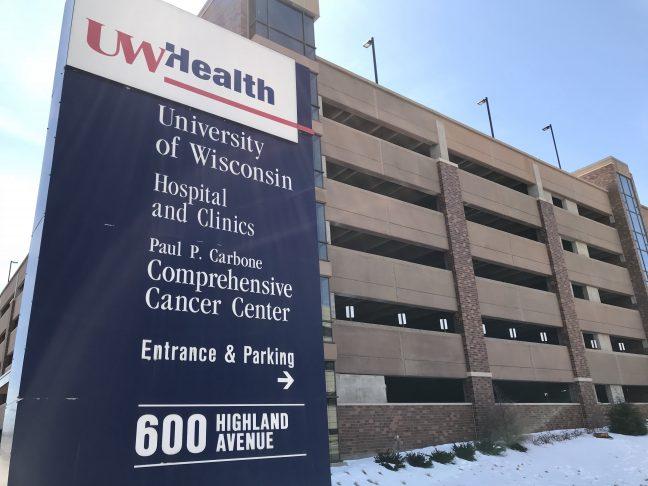Since the Federal Drug Administration approved a new neuroendocrine tumor therapy drug in January, the first patient in Wisconsin recently received the treatment at the University of Wisconsin Carbone Cancer Center.
Lutetium Lu 177 dotatate — known as Lutathera — is the first radioactive drug that has been approved to treat advanced NETs affecting the pancreas and gastrointestinal tract. So far, the treatment has shown positive effects, with Noelle LoConte, UW associate professor and Carbone Cancer Center physician, lauding its success.
“[Lutathera] looks like a really fantastic drug in trials,” LoConte said. “It is the best drug out there for this cancer — if you can’t do surgery — in the history of treatment for this.”
The drug’s radioactivity is one aspect that has drawn much attention because of its potential danger. In ensuring safety for everyone involved in the process of using Lutathera with a patient, extra precautions are required.
For every session, Environmental Services covers the walls of the treatment room with a nonwater permeable gauze-like material as well as a plastic backing to protect against spillage, including vomit. Before physicians can administer Lutathera, they first give patients an influx of amino acids to protect their kidneys, which has caused 40 percent to report extreme nausea or vomiting, LoConte said.
“We are concerned about — for lack of a better word — yacking up radioactive stomach contents,” LoConte said.
In an effort to diminish this potentially hazardous side effect, the Carbone Cancer Center has begun working with a pharmacy in Florida on amino acids that do not cause nausea, LoConte said.
In addition to room setup, the center must also ensure no pregnant or nursing women are in close proximity to Lutathera and dispose of all materials properly. Carbone also must limit patient interaction with others because individuals who have undergone treatment are still able to transmit some radiation to those within arm’s length for a few days following the session, LoConte said.
Despite potential risks, patients have still been very open to the treatment, and the effort to receive approval on Lutathera was a “Herculean effort” that received little to no pushback, LoConte said.
Carbone Cancer Center Dr. Steve Cho, Associate UW Professor and Director of Radiopharmaceutical Production Facility, expanded on this idea, emphasizing the multidisciplinary approach devoted to obtaining FDA approval. Because of the intensive collaboration on Lutathera, this process took two months instead of a predicted six, LoConte said.
“Once this was approved, I think that there was a huge push,” Cho said. “We were all anticipating this and after initial celebration, everyone pulled up their sleeves and got to work.”
One of the factors of drug approval making the process possible is patient advocacy groups, which raise money, provide funding for trials or grants and spread awareness about cancer, LoConte and Cho said.
UW researchers aim to understand why some cells turn cancerous
In this case, one foundation worked closely with physicians, including LoConte, to get Lutathera tested and approved for more personal reasons.
In 2013, Aly Wolff passed away at age 20 from a rare NET cancer. Her parents, Russell and Sheila, run the successful charity Aly envisioned dedicated to helping others with cancer.
Almost all the money they raise goes to the Carbone Cancer Center, which uses it as seed money to get projects off the ground. The Aly Wolff Foundation donated money used to fund clinical trials ultimately leading to the approval of Lutathera, which was “bittersweet” because this drug was only available in Europe when Aly was ill, and she did not qualify for treatment, Russell said.
“For us, it’s extremely gratifying because we’ve been apart of something to bring [Lutathera] here, and it wasn’t here when she was sick,” Russell Wolff said.
Going forward, Cho hopes the approval and successful implementation of Lutathera will serve as a paradigm for the passing of similar treatments.
Though FDA guidelines currently state the only patients allowed to receive this drug are those with specific NET tumors, Cho believes the next steps of this process will be expanding these strict rules.
UW professors advocate for more patient empowerment, awareness in medical fields
“The reason we’re really excited about this is I think it’s really a game changer,” Cho said. “Usually FDA approval is the starting point, and then once the drug becomes available it can be incorporated into different treatments.”
The Carbone Cancer Center is currently the only place in Wisconsin — and one of 20 nationwide — offering Lutathera, Russell Wolff said.l But LoConte believes in the next year or so, there will be multiple statewide treatment locations.
LoConte, one of the many doctors at Carbone who treated Aly Wolff, expressed gratitude for the Aly Wolff Foundation and other patient advocacy groups that make it possible for doctors to conduct research crucial to important medical discoveries.
“Ally’s group really raises our visibility as a treatment center,” LoConte said. “We partner with them because these kinds of rare tumors are horribly underfunded by the government and we realize in order to get new treatments we needed to find new ways to fund our work. We want to have an institution where a scientist has a great idea and then has space to explore that.”

















